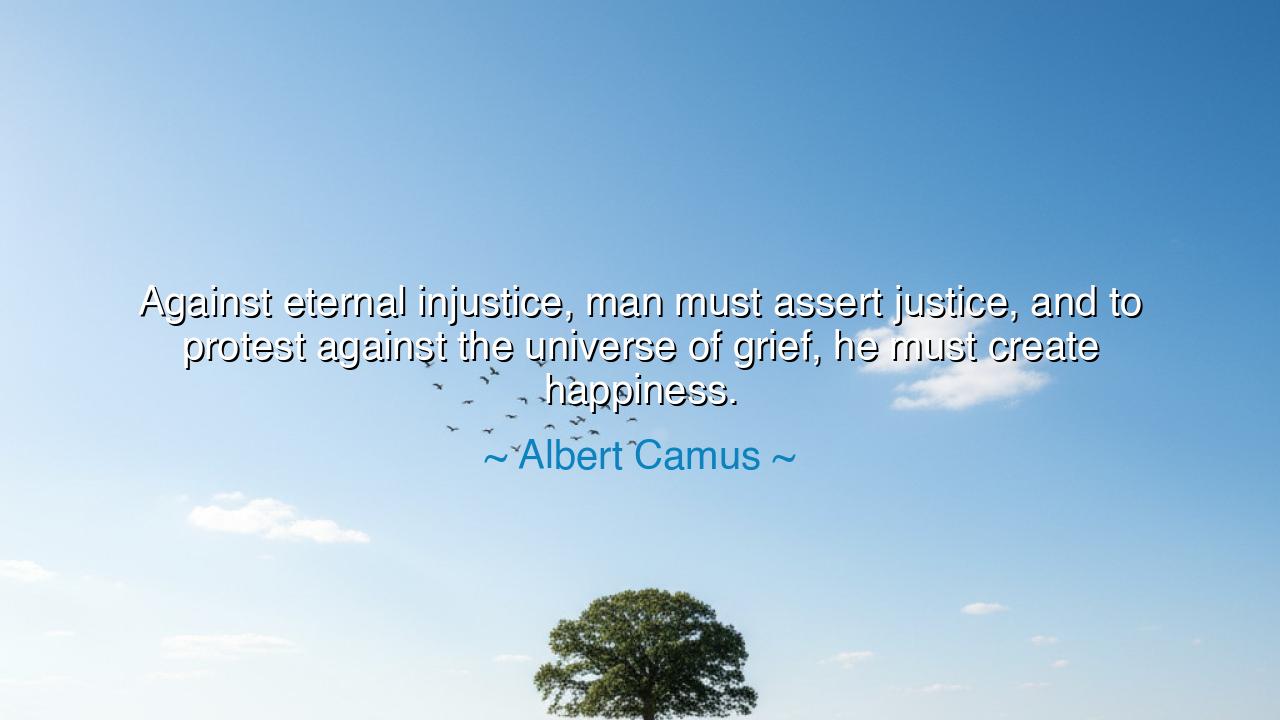
Against eternal injustice, man must assert justice, and to
Against eternal injustice, man must assert justice, and to protest against the universe of grief, he must create happiness.






“Against eternal injustice, man must assert justice, and to protest against the universe of grief, he must create happiness.” Thus spoke Albert Camus, the philosopher of the absurd, the poet of revolt, whose words burn like torches in the darkness of existence. In this declaration, Camus summons humanity to its noblest duty — the defiance of despair through creation, the refusal of cruelty through justice, and the triumph of the spirit over the silence of a cold and indifferent universe. It is a cry not of surrender, but of rebellion — the sacred rebellion of the human heart that refuses to yield its meaning to chaos.
Camus, born into poverty in French Algeria, lived amid war, occupation, and existential crisis. He saw the 20th century drenched in blood — empires collapsing, ideologies warring, nations dividing, and millions crushed under tyranny. In this world of injustice and grief, he perceived what he called “the absurd” — the conflict between man’s hunger for meaning and the world’s indifference to that hunger. Yet, unlike the nihilist who surrenders, Camus demanded that we respond with action, with compassion, and with courage. If the universe offers no justice, he said, then man must create it. If life offers no happiness by right, then we must build it with our own hands. In this act of creation, humanity becomes heroic — a light against the void.
To assert justice in the face of eternal injustice is no easy task. It is to stand as a lone figure before the storm and say, “You shall not pass without resistance.” It is to face oppression, cruelty, or indifference and yet act as if righteousness were inevitable. This is what Camus called the “revolt of the soul” — not a violent rebellion, but a moral one. The soldier who refuses to kill the innocent, the citizen who speaks truth against the despot, the parent who teaches kindness in a world of hatred — each is asserting justice against eternity’s indifference. This rebellion is the essence of our humanity; it is the sacred refusal to become what we despise.
And to create happiness in a universe of grief — that, too, is an act of resistance. For Camus, happiness was not a naïve escape from suffering, but a courageous creation amid it. Think of the artists who painted beauty while their nations burned, or the lovers who held each other in the ruins of war, or the teachers who nurtured hope in children though the world seemed lost. These were not escapists; they were warriors of the spirit. Their joy was not ignorance — it was defiance. To smile in suffering, to dance in ruin, to love in darkness — that is to create happiness as a form of protest, a declaration that life, even when cruel, is still sacred.
History offers countless examples of this heroic defiance. Consider Viktor Frankl, the psychologist imprisoned in Nazi concentration camps. Surrounded by death and horror, he discovered that even in the lowest depths, one retains the freedom to choose one’s attitude. He chose to love, to help, to find meaning — to create happiness where there was none. In doing so, he echoed Camus’s vision: against the injustice of his captors, he asserted human dignity; against the grief of his surroundings, he cultivated hope. His survival, not just of body but of soul, stands as proof that even in humanity’s darkest hours, the light of the human spirit cannot be extinguished.
Camus’s message is not only philosophical but profoundly moral. He calls upon us to take responsibility for the meaning of our existence. The world may be unjust, but our hearts need not be. The world may be cruel, but our hands may still be gentle. The universe may not care for us, but we can care for one another. In this act of choosing justice and creating happiness, we redeem the meaning that the cosmos withholds. It is not God or fate who defines goodness — it is we who define it through our actions, our empathy, and our courage.
Let this then be the lesson: do not wait for justice to descend from the heavens; build it upon the earth. Do not wait for happiness to find you; create it in the lives of others. When you see oppression, speak. When you see sorrow, bring comfort. When the world grows cold, be the warmth that endures. Camus teaches that the human condition, though fragile, is magnificent precisely because it resists despair. We are not powerless before the void; we are the artists who paint light upon its darkness.
Thus, in the eternal struggle between injustice and justice, grief and happiness, we find the meaning of life itself. To live is to rebel with goodness. To love is to defy the universe’s indifference. And to create — to build beauty, kindness, and joy — is to stand alongside the immortal words of Albert Camus, declaring with our lives: “Against eternal injustice, man must assert justice, and to protest against the universe of grief, he must create happiness.”






AAdministratorAdministrator
Welcome, honored guests. Please leave a comment, we will respond soon